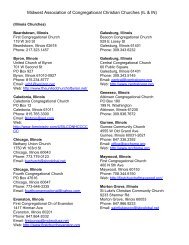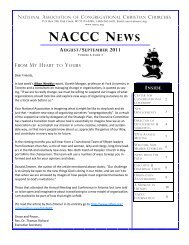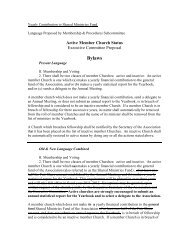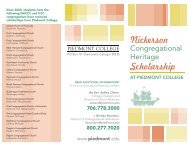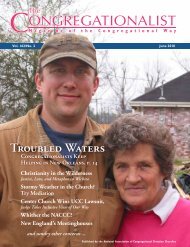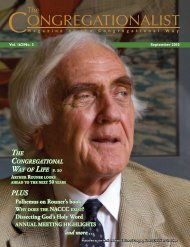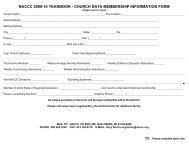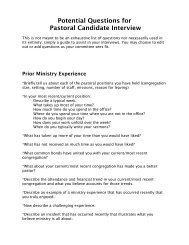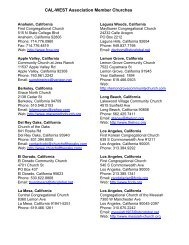8473 South Howell Avenue Oak Creek, WI 53154-0288 - National ...
8473 South Howell Avenue Oak Creek, WI 53154-0288 - National ...
8473 South Howell Avenue Oak Creek, WI 53154-0288 - National ...
Create successful ePaper yourself
Turn your PDF publications into a flip-book with our unique Google optimized e-Paper software.
Ask someone what it means to be a<br />
member of a Congregational church and<br />
you discover there are a lot of different<br />
answers. The church of my childhood was<br />
a Congregational Church. I have been an<br />
ordained Congregational minister for 25<br />
years. One of the biggest challenges for<br />
the average Congregational church today<br />
is defining what it means to be a Congregational<br />
church!<br />
How do we define what it means to be<br />
a Congregational church? One way to<br />
discover a definition of a Congregational<br />
church is to look at some of the writings of<br />
Congregationalists—in particular to look<br />
at a few of the Congregational manuals<br />
that were written to explain the principles<br />
of Congregationalism. The first manual<br />
I ever owned I purchased at a yard sale.<br />
Since then I have made a habit of collecting<br />
these interesting books written<br />
by such people as: John Mitchell, George<br />
Punchard, John Le Bosquet, and Thomas<br />
C. Upham.<br />
These manuals provided a concise,<br />
Biblical, and visionary definition of a<br />
Congregational church. These definitions<br />
were the ones commonly accepted<br />
during a time of remarkable growth<br />
in the Congregational churches. The<br />
influence of these definitions is still<br />
experienced today.<br />
George Punchard writes a definition<br />
that embraces the foundational, distinctive<br />
principles of Congregationalism:<br />
“Congregationalism is that system<br />
of church government, in which the<br />
Scriptures are recognized as the only infallible<br />
guide respecting church order and<br />
discipline;—and which maintains, that,<br />
according to the Scriptures, a church is a<br />
company, or congregation, of professed<br />
Christians, who, having voluntarily covenanted<br />
and associated together to worship<br />
God and to celebrate religious ordinances,<br />
are authorized to elect necessary officers, to<br />
discipline offending members, and to act,<br />
authoritatively and conclusively, upon all<br />
appropriate business, independently of the<br />
control of any person or persons whatsoever”<br />
(Punchard, 1844, p. 29).<br />
This visionary definition of a Congregational<br />
church is simple and yet comprehensive<br />
in its wording. It contains the<br />
main principles of Congregationalism.<br />
1) scripture is the infallible guide of<br />
church order and discipline. Historically,<br />
the churches of the Congregational way<br />
have acknowledged Scripture to be God’s<br />
Word. It was a desire to be like the church<br />
in the New Testament that shaped the<br />
Congregational churches.<br />
One of the interesting things about<br />
Congregational churches is their understanding<br />
that we are always learning what<br />
Scripture has to say. Each generation has<br />
to learn from the previous generation and<br />
apply what the Scripture says to their<br />
generation. I appreciate the following<br />
statement by Art Rouner:<br />
The Bible “is the book which our fathers<br />
intended to be the guide of our Way. Because<br />
only here can we meet our Christ;<br />
only here can we meet Him in all His fullness<br />
and know in our hearts the Truth that<br />
‘Jesus is Lord!’” (Rouner, 1960, p. 103).<br />
2) a church is a voluntary association.<br />
This principle of Congregationalism has<br />
been widely adopted by churches in<br />
America. In America the government does<br />
not support a particular denomination.<br />
Religion is a matter of individual choice.<br />
Individuals have the freedom to join a<br />
local church. They also have the freedom<br />
to not join a local church. They can even<br />
make the decision to leave one church and<br />
join a church down the street<br />
Continued g<br />
sourCes<br />
Mitchell, J. A Guide To The Principles And Practice of the Congregational Churches of New England: With a Brief<br />
History of the Denomination. Northampton: J. H. Butler, 1838.<br />
Punchard, George. A View Of Congregationalism, Its Principles and Doctrines, The Testimony of Ecclesiastical<br />
History in Its Favor, Its Practice and Its Advantages. Andover: Allen, Morrill and Wardwell, 1844.<br />
Rouner, Arthur A. The Congregational Way of Life. Hammond Publishing Company, 1960.<br />
The idea of the<br />
church being a<br />
voluntary association<br />
is not about<br />
consumer choice.<br />
It is really about<br />
building loving<br />
relationships.<br />
21



